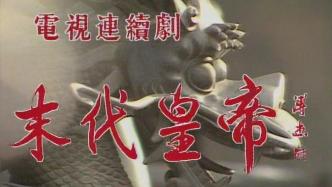
The first batch of films released by the "Revisiting Classics" channel includes two works directed by Zhou Huan - "The Last Emperor" and "God is Above". Among them, "The Last Emperor", which will be concluded on May 18 (this Saturday), reflects the changes in China's modern history through the life of the last emperor Puyi. With its true restoration of historical scenes, accurate grasp of character creation and in-depth excavation of ideological connotations, it has left a strong mark in the history of historical drama creation.
After the show was aired in 1988, it attracted widespread attention and praise, and won many honors, including the 9th China TV Drama "Flying Apsaras Award" Series Special Award, Outstanding Screenwriter Award (Wang Shuyuan), Best Actor Award (Chen Daoming, who played the young Puyi), Outstanding Supporting Actor Award (Niu Xingli, who played the eunuch Zhang Qianhe) and Outstanding Art Award (costumes and props), and it was also the first Asian drama to win an international award. Today, with "The Last Emperor" being broadcast again on the "Revisiting Classics" channel, the story behind the work has also gained more aftertaste after years of precipitation.
Recently, the China Television Art Committee specially invited director Zhou Huan to be interviewed to review the stories behind the scenes of "The Last Emperor".
The Last Emperor is a drama that was initiated and personally created by Mr. Jin Shan, the initiator of the China Television Art Committee (hereinafter referred to as the "Art Committee") and then president of the Central Academy of Drama. Playwright Wang Shuyuan served as the screenwriter, and Ruan Ruolin, then deputy director of CCTV and director of the China Television Drama Production Center, organized and invited Mei Qian, a famous director of the Beijing People's Art Theater, to serve as the artistic director... Many veteran artists in various positions have worked hard to create this classic. Director Zhou Huan, who has won many honors such as the Chinese TV Drama "Flying Apsaras Award" for his plays such as "Bonus" and "Story of Life", directed and witnessed the entire process of the birth of the drama.
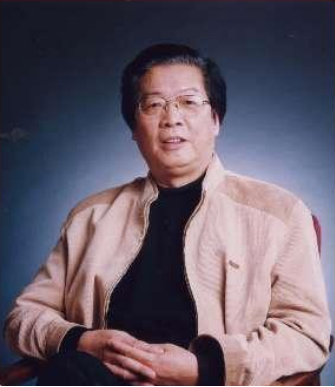
Kingsoft opens the "prologue" of "The Last Emperor"
Q : How did your relationship with "The Last Emperor" begin?
A : At that time, Jinshan initiated the establishment of the Art Committee with the special approval of the Central Committee. Then he discussed with Wang Shuyuan and said that our Art Committee must come up with a work, and asked Wang Shuyuan to consider it. Wang Shuyuan happened to read Puyi's memoir "My First Half of Life", and asked if we could film it? Jinshan said yes, we could. So Wang Shuyuan wrote the script at that time. But at that time, Jinshan asked Wang Shuyuan to write a comedy, so there are many very humorous (lines) in the play we filmed later, which were actually left over from the original script. In the end, it was not filmed, and Jinshan passed away.
Later, the station (CCTV) decided to shoot this drama and invited Mei Qian. Mei Qian had directed movies in the 1930s. He said, "I have never directed a TV series. Can you find me a young (director) who has directed TV series?" Because I graduated from the Central Academy of Drama and transferred back to the (Central Broadcasting Troupe), the old director at that time directed dramas to train actors and asked me to direct "In the Silence". (Director) Comrade Chen Geng specifically said, "I will find you a teacher." He invited Mei Qian to be my artistic director. We met there and he knew me. So Mei Qian proposed to Ruan Ruolin that Zhou Huan should be the (director). The person who "whispered" next to him was Wang Shuyuan, because Wang Shuyuan was my teacher and we had a good relationship when we were in the Central Academy of Drama. Wang Shuyuan also told Ruan Ruolin to let Zhou Huan come. So it was decided that I would be the director (of "The Last Emperor"). During the entire filming process, I was very grateful to Mr. Mei Qian, who insisted on pushing me to the front.
Q : What efforts did you make to complete this play?
A : When we were rehearsing the play "The Last Emperor", Mr. Mei Qian had strict requirements on us, asking us to really understand history. He personally led us to collect materials. At that time, he invited Zhu Jiahui, an expert on Qing history from the Palace Museum, to give us lectures. Pu Jie and a friend of Pu Yi also served as our consultants. Because Zhu Jiahui only knew about life in the palace. The Palace Museum was full of halls and so on, and there was no record of real life in the palace. From the time when the little emperor entered the palace, including all the rules in the palace... We sent a stage manager named Qian Yuesheng to follow Zhu Jiahui. Zhu Jiahui talked and he took notes. Do you know how much information we recorded? Three big wooden boxes.

Another thing is that Yi Shizhi of Beijing People's Art Theatre was very supportive of this play. I counted that there were nearly 60 veteran artists of Beijing People's Art Theatre in the play. Not all of them played the leading roles. Those who played extras (actors) were all very famous, but they were not acting as extras. At that time, we were doing desk work, and Yi Shizhi gave us the meeting room of Beijing People's Art Theatre's Capital Theatre. Mei Qian said to Zhou Huan, "Come and talk about the director's conception." I said, "Please don't bother. These people are all my elders, all veteran artists. How can I go there and talk about the director's conception?" This is not okay. (Mr. Mei said) You must talk. I talked, and the old man sat next to me, and all these veteran artists were taking notes seriously. Then Zhu Jiahui and Pu Jie were talking, introducing materials, and teaching them etiquette. The actors of People's Art Theatre were all there to learn court etiquette honestly.
Zhu Xu and I became good friends because we were rehearsing the play Bonus together. I said, you have to play the role of the old Pu Yi. I gave Chen Daoming a look, but he was too young, so you should play it. (Zhu Xu joked) I won’t play it. He has played all the roles and finally changed his role and asked me to play it. I said it was over. I didn’t expect that a few days later, the old man read all the materials, including the documentary, and finally called me to let me play the role. He accepted the role.
Many of the styles of our team were brought to us by these veteran artists.
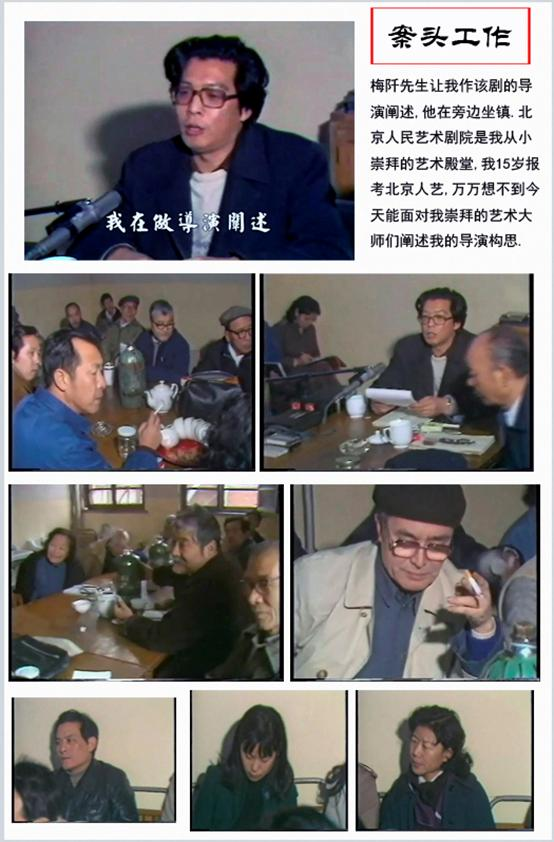
The words and deeds of the veteran artists of the National Theatre of China made The Last Emperor a success
Q : How do the veteran artists interpret this play?
Answer : Let me give you a few examples.
When we were rehearsing the play in the Shufangzhai of the Forbidden City and the emperor was watching the play, Lan Tianye, Wu Xue and others who played the ministers could only sit on the corridor. Only Puyi and his imperial concubines were in the main hall. It was so hot that day. It was so hot in Beijing. I was really educated. All the old actors, Wu Xue and Lan Tianye, wore court robes because they were sitting there in front of the emperor, and they didn't move at all. Even if they stopped the machine to rest, they would never move. They couldn't move even if they were sweating. There was no air conditioning at that time. There was only an electric fan in the main hall. A young actor was so hot that he took off his clothes and tied them around his waist, squatted next to the electric fan and sat there. Niu Xingli went over and pulled him up, what are you doing? Your clothes are all wrinkled. Pull him up and come and see what you are doing, pointing to Wu Xue and Lan Tianye in the corridor. Do you know what you are doing? That's called going into battle. You just took off your clothes and sat here! The man put on his clothes honestly. These are the artists of the National Theatre of China. To be honest, our team, this creative collective, has come this far by watching these veteran artists.
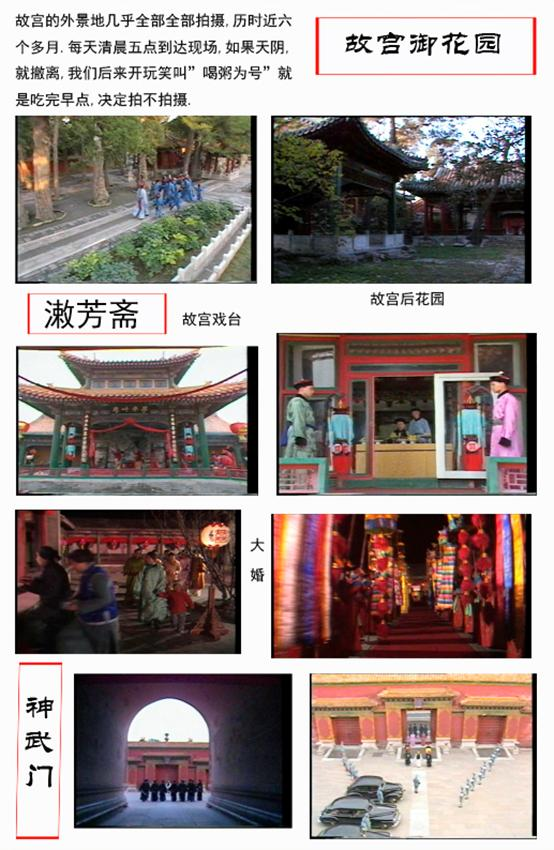
We were rehearsing in the (Summer Palace) Le Shou Hall in winter, it was too cold, and we were not allowed to light a fire. Zhu Lin played Cixi, and her scenes (total) were no more than 20 minutes, and she won the (7th Popular TV "Golden Eagle Award") Best Supporting Actress Award. I admired her so much. When we were rehearsing the (scene) where she (Cixi) met the emperor before her death, she was dressed in the empress dowager's pajamas, which was just a robe. The other actors, including us, wore two cotton coats, a cotton jacket inside and a cotton coat outside, it was too cold. She only wore a pajamas. She lay there, and the (bed) mattress was very thin because it was a prop. Later, before rehearsing, I told the old lady, you should wear a sweater inside. (She said) What kind of sweater? I am the empress dowager, can I sleep in my palace with such a bulge in my clothes? I just wore this. Later, when I went to the People's Art Theater, the old lady ran into me and (jokingly said) Zhou Huan, you have to compensate me for this leg, because I got cold legs at that time. After saying that, she laughed and said, "Don't worry, it's okay. I've cured it." This is the artist of the People's Art Theatre, and it touched all of our staff.
Tong Chao was acting in a movie by Xie Jin at the time. He had a cerebral thrombosis and could not get cold. Every time he came to Leshou Hall for rehearsal, our staff would tie two carrying poles to a chair, pick him up from the east gate of the Summer Palace, put two cotton coats under the chair, and cover him with two more cotton coats on top, and carry him all the way to Leshou Hall. When he arrived, there was a room for management personnel next to him, where there was a fire. After Tong Chao was carried in, he was placed in that room and invited to Leshou Hall for rehearsal. Tong Chao was wearing a cotton coat on the outside, but he took it off as soon as he entered the scene, because they had to kneel when they saw the Empress Dowager, and the ground was cold, so they knelt down with a "bang". Ding Ni, who played Wanrong's father, had a bad leg. Later, we said that it would take half a day to adjust the light, and you should not kneel when adjusting the light. The staff would kneel there for you, and you should kneel again when the official shooting started. No, they absolutely did not agree, no matter how hard you tried. (Say) Do you understand? My face shape is different from his, so I had to kneel down to face the light. He wore a court dress and knelt down on the cold ground. It moved us staff members. When the production was stopped, the staff members went up to him and put his cotton coat on him. Not only did they put it on him, they hugged him in their arms. That's why I say that our team was brought up by these old artists.
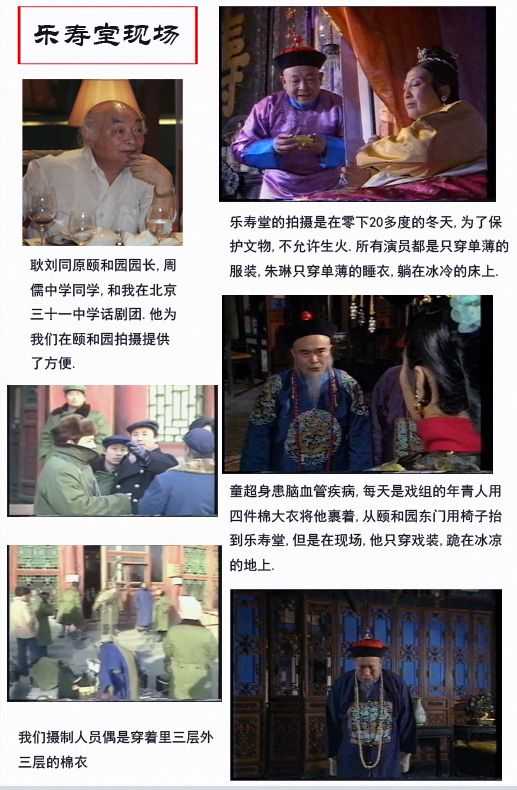
When rehearsing, Mei Qian sat next to me. He told me his opinions and I passed them on. He spoke to me in a low voice. He also told me that when you discuss opinions with actors and various departments, you can't shout loudly. You have to respect others and tell them what to do gently. So there was no loud noise on our set, and the old artists were very happy with this creative atmosphere. Later, when we rehearsed all the plays, my team absolutely didn't make a loud noise on the set, and everyone respected each other. Mr. Mei not only pushed me forward in art, but more importantly, taught me many things, including moral character.
Q : How do you view the significance of "The Last Emperor" now?
A : I think Wang Shuyuan and Jin Shan are great artists. Why? The Last Emperor is very relevant today.
Why does our play attract audiences? In fact, it is because of the good theme of the creation. It tells the story of how an innocent child becomes a sadist. This is not just a lip service, but is specifically shown in every detail of life. It is the relationship between people (in the palace) that makes him bad. Why does human nature change? It is caused by feudal society. But our play does not simply talk about this.
Pu Yi, played by Chen Daoming, cut down the threshold of the Forbidden City in order to ride a bicycle. This is a fact, not a fabrication, which shows that he wanted to rush out. A very important line in this play is that he wanted to rush out of the yellow circle (Forbidden City). This was taught to him by a foreign teacher. I think this scene has practical significance. Today, we must be careful in educating children. It is not that you can only beat or yell at them, or tell them how to reason. No, it is actually a subtle influence. One of the most interesting things I learned after the show was broadcast that year was that many families called their children little emperors. Oh, don’t let your family get used to it, or they will become little emperors. This is the influence of this play.
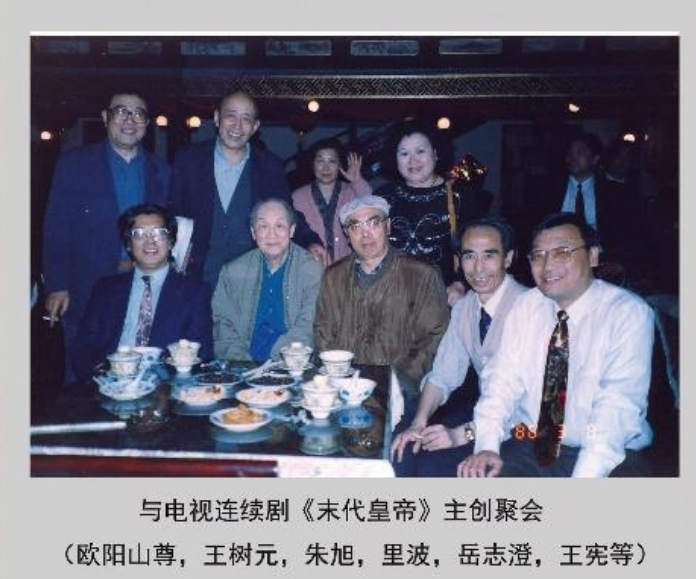
The play "The Last Emperor" has a practical significance today. It is said that we must not become slaves of a conquered nation. This is where Wang Shuyuan's strength lies. He uses many details of life to explain how painful it is to be a slave of a conquered nation. What is the theme of this play? It is about Zhu Xu and the elderly Pu Yi. It is about how he changed from an inhuman person to a real person in the Fushun (War Criminals) Correctional Institution. It was a world-shaking event to transform the emperor into an ordinary citizen. When we were rehearsing, the director of the Fushun (War Criminals) Correctional Institution followed us all the time. Li Moran played that director. He used many details to explain how Pu Yi's humanity was transformed.
This play describes how the Chinese Communist Party turned a ghost back into a human being. The script was very cleverly written. For example, in the last scene, the war criminals were celebrating a festival and were going to perform a live newspaper play. They asked Puyi to play a role, and asked him to play an American soldier. They gave him a line, "Why am I so miserable?" When it was his turn, he said he had forgotten it. Someone next to him reminded him, "Why am I so miserable?" As soon as this line was said, Puyi stood up and said, "I'm not miserable, I'm really not miserable." He talked about himself. It's not like now (rehearsing a play). When we talk about receiving education, it's like an editorial. What's the point of sitting there and talking? He used such a detail. So I say Wang Shuyuan is a very talented writer. Jinshan and Li Bozhao definitely give Wang Shuyuan a thumbs up.
So for the play "The Last Emperor", we started with Wang Shuyuan's script and applied the methods taught by Mr. Mei, which helped us reach a new level in artistic creation.
Li Hanxiang, Bertolucci and The Last Emperor
Q : Hong Kong director Li Hanxiang once shortened the first ten episodes of this drama into the movie "The Last Dynasty". How did your collaboration develop?
A : At that time, we were filming in the studio. One day, Ruan (Ruan Ruolin) suddenly came and brought someone with her. She told me that Director Li came to see me today. Who was Director Li? She said Li Hanxiang. When I heard Li Hanxiang, my mind exploded, because at that time we were rehearsing the Last Emperor, and he was also preparing to rehearse Puyi (theme). (Ruan Ruolin) also told me that Director Li was going to transfer your first 10 episodes to film and make a movie. I got even angrier. It was a bargain, right? This was the first time we met. So Li Hanxiang and I were "confronted" from the beginning.
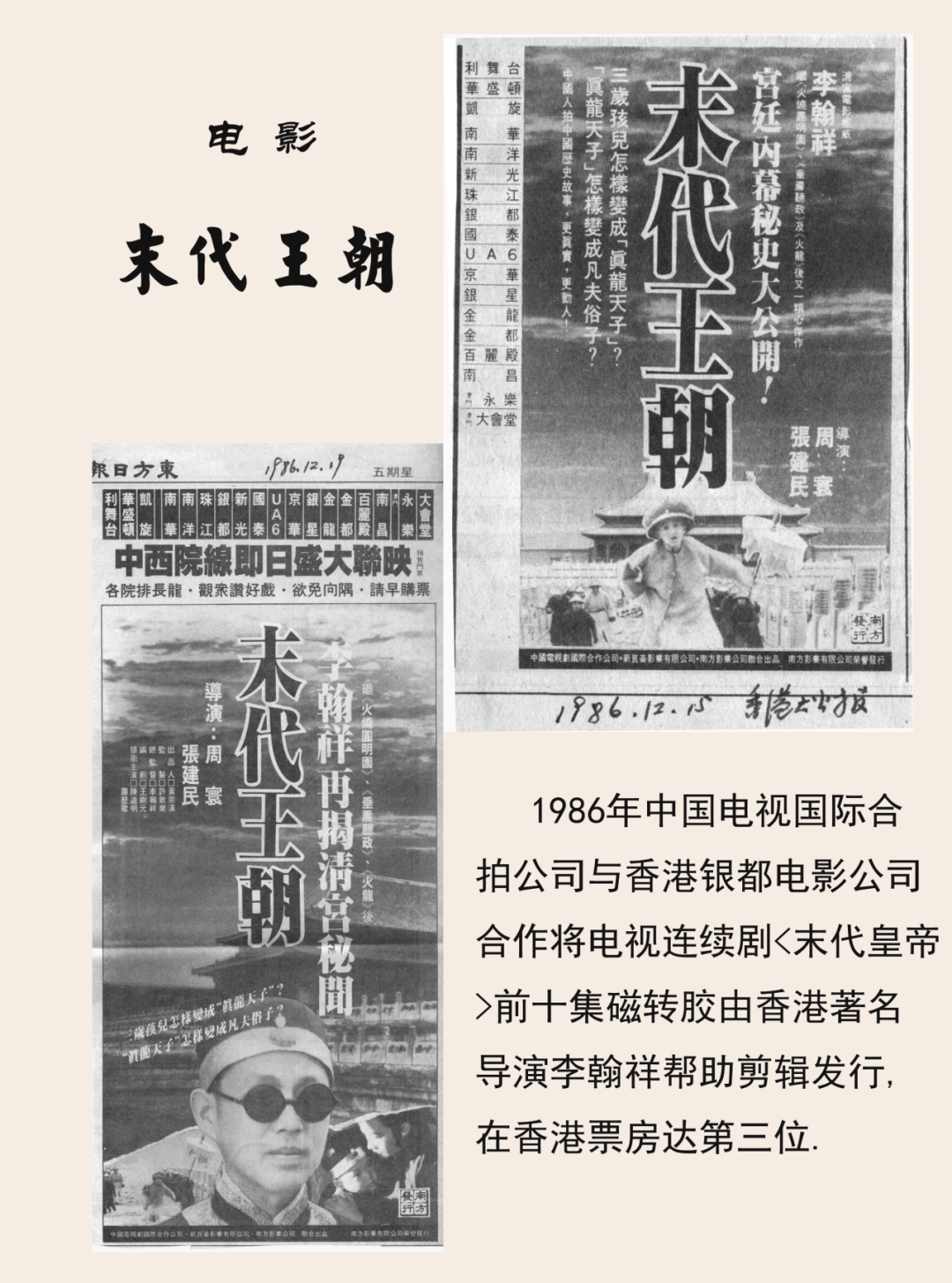
The premiere of The Last Dynasty was in Hong Kong. As soon as we got off the plane, Li Hanxiang was quite attentive and said to us, "Look, this is the poster for the film." I saw that it said "Supervisor Li Hanxiang, Director Zhou Huan." It was just my name, and Zhang Jianmin's name was not there. All my movies are starred by Zhou Huan and Zhang Jianmin, and this guy has been with me all my life. But his name was not there, so I got mad. After getting off the plane and going to the press conference, the first sentence of my speech was: This movie was not shot by Li Hanxiang, but by me. In addition, the directors are Zhou Huan and Zhang Jianmin. I was not polite. Most people would not tolerate this, but Li Hanxiang was not angry. The next day, I went to the press conference, and I saw that the advertisement had not been changed. Zhang Jianmin went to Hong Kong with me, and I said I would not go, and neither of us would go. We just sat in the hotel. I thought this matter would cause unhappiness, but Li Hanxiang never got angry with me. His assistant director Xia Zuhui was surprised, saying that Li Hanxiang was a big shot in Hong Kong and Taiwan, and he was very powerful. No one slammed the table and scolded him in front of him like I did. He said it was strange that Li Hanxiang was so (kind) to Director Zhou, and he never (got angry) no matter what he did to Li Hanxiang.
Li Hanxiang had a house in Beijing. Later, he would take me to his house every New Year and other holidays. We would drink and chat. When he was rehearsing "The Burning of the Afang Palace", he had a heart attack. His wife's brother, who was his lighting engineer, called me and said Director Zhou, Director Li is not doing well. I said, "Then hurry up and save him." He said, "We are saving him. Director Li just said something to me." (Li Hanxiang) grabbed him and said, "When you have no food to eat in the future, go find Zhou Huan." Later, when I was filming "God is Above", his wife's brother worked as my lighting engineer and was very hardworking.
I learned a lot from Li Hanxiang. Although I scolded him for editing the film, I learned a lot from watching it. He had already edited it in the early stages, so I "stole" a lot of his things. Later, I understood the rhythm of shot editing, including the language of the shots. So I say Li Hanxiang is my master and mentor.
Q : Did you have any connection with Bertolucci, the director of the film version of The Last Emperor of the same period?
A : At that time, someone in Macau approached me and wanted to make a movie about the missionary Matteo Ricci, and asked me to be the director. After this news came out, someone suddenly came to me one day and said that Bertolucci sent me and heard that you were going to make "Matteo Ricci" and he wanted to work with you.
This person said that one thing Bertolucci has been talking about is that after the TV series "The Last Emperor" was broadcast, the then famous Italian newspaper "Unita" sent two female reporters to interview me: "Now there are two "The Last Emperor", what do you think?" I said that as an internationally famous director, Bertolucci has a lot of things in art that we can learn from; in addition, a foreigner is willing to bring Chinese stories abroad, and as a colleague, I have to thank him. But there is a problem, he is a foreigner after all, and I know Pu Yi better than him. If I were to shoot the Italian dictator Mussolini, I might not be able to shoot him better. But I am not necessarily worse than him in shooting Pu Yi.
This person said that they told Bertolucci after the interview that he was very impressed with me and wanted to work with me. I was also very happy to work with Bertolucci, but I never expected that after this person went back, Bertolucci suffered a cerebral hemorrhage and became paralyzed on one side of his body, and this project did not succeed.
This is a little aftertaste of our "The Last Emperor".
Revisiting the classics is also revisiting the creative process of the classics
Q : What do you think about the broadcast of "The Last Emperor" on the "Revisit Classics" channel?
A : I think this kind of activity is very good. I hope that the directors and writers who are still working and fighting today must have a sense of the audience and must keep up with the times. To go deep into life, you must get close to it and find the most lovely and touching things in them - we call it "drama", not to talk about it like an editorial, which is not a work of art. You must use your artistic means to infect the audience.
Oral guest: Zhou Huan (National First-Class Director)
Special interview and compilation: Lin Hui (oral history expert at Communication University of China)
Production team: Li Yan, Wei Ke, Liu Da (Communication University of China team)
Planning: Zhao Cong and Li Xuan
Attachment: Director Zhou Huan's artistic resume
Zhou Huan, born in February 1943, is a native of Beijing. He is a national first-class director of China Television Drama Production Center of CCTV, a member of China Television Artists Association, a member of China Film Directors Association, and a director of Chinese Rap Art Research Society. In 1991, he was approved to enjoy the special government allowance of the State Council of the People's Republic of China. In 1995, he won the first Academy Award (Director Award) of the Central Academy of Drama.
Main director works
TV series "The Last Cancer Death" (1979) (director's first TV series)
TV series "Firefly" (1980)
TV series "Tianshan Story" (1981)
TV series "Bonus" (1981)
TV series "The Story of a Small Town" (1982)
TV series "Story of Life" (1983)
TV series The Last Emperor (1988)
TV series "Drinking Buddies" (1988)
TV series The Legend of Tong Ren Tang (1990)
TV series "The Days of Leaving Hiroshima" (1993)
TV series "God is Above" (1995)
TV series "Kanto Gypsies" (1997)
TV series "World Fortune" (1998)
Drama "Green Mountains Forever" (2003-2006)
TV movie Wet Paint (2004)
TV series "Executive Director" (2002)
TV series "Dialogue of Life" (1994)
Drama "Wet Paint" (2014)
Award-winning works
Won the Chinese TV Drama "Flying Apsaras Award":
The TV series "Bonus" won the second prize of the 3rd "Flying Apsaras Award" for single drama
The TV series "The Story of Life" won the second prize of the 4th "Flying Apsaras Award" TV series
The TV series "The Last Emperor" won the 9th "Flying Apsaras Award" TV Series Special Award
The TV series "Drinking Buddies" won the third prize of the 10th "Flying Apsaras Award" for short TV series
The TV series "The Days of Leaving Hiroshima" won the third prize of the 14th "Flying Apsaras Award" for long-form TV series
The TV series "God is Above" won the third prize of the 16th "Flying Apsaras Award" for long-form TV series
TV series The Last Emperor
Won the Outstanding TV Program Award at the 25th Cannes International Film Festival and was nominated for the 13th "ACE" Award for Best Foreign TV Series in the United States
TV series "The Days of Farewell to Hiroshima"
Won the Japan Film and Television Critics Award and the Japan NHK Special Award
Drama "Green Mountains Forever"
Won the Heilongjiang Province Winter Art Outstanding Drama Award, Heilongjiang Province Drama Repertory "Lilac Award", and the State Forestry Administration Forest Culture Award


